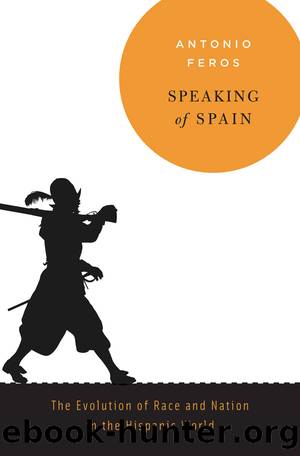Speaking of Spain by Antonio Feros

Author:Antonio Feros [Feros, Antonio]
Language: eng
Format: epub
ISBN: 9780674045514
Barnesnoble:
Publisher: Harvard
Published: 2017-04-03T00:00:00+00:00
Of greatest importance and relevance here, however, is not so much the political-institutional reforms or the new economic policy designed to more efficiently exploit the New Worldâs riches but the elaboration of new discourses and ideas about the different population groups that coexisted on American soil. It is unsurprising that the Enlightened elite would have shown great interest and enthusiasm for developing theories about these human communities. After all, they had already turned an inquiring lens on themselves, the peninsulars, and logically they would be interested in other groups under Spanish sovereignty in the Americas. The Spaniards were not by any means the only community interested in the origins and characteristics of different peoples or nations. In all European countries, regardless of their position in the hierarchy of empires, there were significant movements toward what we now refer to as scientific racism, or at least important advances in what eighteenth-century authors called the science of man.
This is not to say that what would be referred to as scientific racism completely displaced theories developed in previous centuries. On the contrary, these were still essential to eighteenth-century Spanish thought, and numerous authors and royal ministers continued to rely on them and to defend the central tenets of these theories. Recent studies have demonstrated that the shift from the theory that all humans were fundamentally alike to one that divided the human species into races with radically different characteristics was gradual and protracted. Only in the nineteenth century did a distinctly racialist discourse became truly dominant.21
Scholars have drawn attention to the presence of terms such as race and ethnicity in the dictionaries of the largest European languages. The word ethnic, for example, in this era still had a clearly religious rather than racial significationâa reference more to non Christians and uncivilized peoples. This was the meaning of ethnic reproduced in dictionaries published by the Spanish Royal Academy, including the 1780 edition. Indeed, it should be emphasized that this was the primary meaning in all dictionaries up to the one published in 1884, when another was added, more consonant with the modern definition of the word: âBelonging to a nation or race. Ethnic character.â22
The same is true of the word race. In the Dictionary of Authorities published by the academy in 1738, race continued to have the signification of lack of purity of blood or belonging to a vile lineage. It would not be until the dictionary published in 1869 that, for the first time, race was defined as âone of the divisions of humankind.â This conceptual evolution would not be complete until 1884: âRace. Each one of the varieties into which the human species is divided, has certain hereditary traits and above all a specific skin color. They are known as the white [race], yellow, copper-colored, dark or brown, and black.â23
There were two main reasons for this continuity of older meanings of ethnicity and race. The first reason, and a particularly important one in the Spanish case, is that the evolution of racialist concepts and theories was still mediated by religious conceptions.
Download
This site does not store any files on its server. We only index and link to content provided by other sites. Please contact the content providers to delete copyright contents if any and email us, we'll remove relevant links or contents immediately.
Room 212 by Kate Stewart(5105)
The Crown by Robert Lacey(4806)
Endurance: Shackleton's Incredible Voyage by Alfred Lansing(4768)
The Iron Duke by The Iron Duke(4349)
The Rape of Nanking by Iris Chang(4202)
Joan of Arc by Mary Gordon(4099)
Killing England by Bill O'Reilly(3995)
Say Nothing by Patrick Radden Keefe(3975)
I'll Give You the Sun by Jandy Nelson(3428)
Shadow of Night by Deborah Harkness(3356)
Hitler's Monsters by Eric Kurlander(3328)
Mary, Queen of Scots, and the Murder of Lord Darnley by Alison Weir(3200)
Blood and Sand by Alex Von Tunzelmann(3194)
Eleanor & Park by Rainbow Rowell(3151)
Darkest Hour by Anthony McCarten(3119)
Margaret Thatcher: The Autobiography by Thatcher Margaret(3078)
Book of Life by Deborah Harkness(2930)
Red Famine: Stalin's War on Ukraine by Anne Applebaum(2927)
The One Memory of Flora Banks by Emily Barr(2856)
